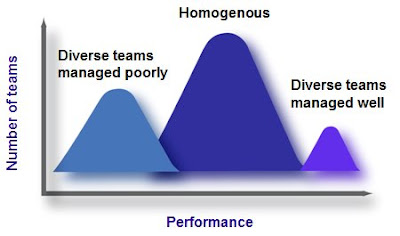Two studies I've come across recently start to unpick what diverse teams need to make them outperform more homogeneous ones. Both are in the area of innovation. What they highlight are "X Factors" which enable certain kinds of diversity to be translated into higher levels of innovative output.
One of the studies is Networks, Diversity and Productivity: The Social Capital of Corporate R&D Teams by Reagans and Zuckerman; Organisational Science, Vol 12, No 4, pp 502-517.
Some highlights:
· 220 corporate R&D teams were studied to see whether mixing people who’d been with a company for different lengths of time made a difference to productivity.
· Productivity was measured by looking at outputs including experimental materials and new patents.
· Actually, the diversity alone had neither a positive or negative effect on productivity.
· Inclusive teams (with frequent connections between the members) achieved significantly higher productivity than teams lacking that kind of culture.
· Inclusive teams that also had diversity were even more productive.
· The study's authors point to the different sets of contacts, information, technical skills and experiences this kind of diversity brings to a team.
There are many version of the picture below which tries to show the impact of good leadership / management on diverse teams. It seems there is an increasing body of evidence to back this picture up.
It is potentially a wasted investment to build diversity in an organisation without considering the X Factors, such as inclusive behaviours among peers, which unlock the value in that diversity.
I'm happy to share more insights into those X Factors. Find out how to contact me here.





No comments:
Post a Comment